Public consultation on RDP 2014-2020
Submission by Transition Kerry (Food Security Group)
Transition Kerry is delighted to have this opportunity to engage with the development of
the of the new RDP 2014 – 2020 support structure.
Transition Kerry believes that it is time to support small-scale horticultural
producers in Ireland therefore helping to develop strong resilient and sustainable
communities. The best way to do this is through the inclusion of Food Sovereignty
and Food Security Principles in the RDP 2014 -2020 Programme.
We strongly believe the levels of supports for export driven food markets should be
balanced with equivalent supports for locally based food production and supply systems
that enhance the health of our rural economy, environment and people.
Transition Kerry is a community and voluntary group operating in communities across
county Kerry and part of the wider international Transition Town Network. Our objective
is to develop a greater degree of resilience in our local communities in response to the
challenges of Peak Oil, Climate Change and continued global economic environmental
and social uncertainty.
We believe that with the right policies and supports local communities can play a more
dynamic role in meeting Irelands carbon and renewable energy targets by providing
affordable, sustainable food system and therefore supporting more resilient local and
national communities.
We are working towards an integrated community-led approach in the areas of energy,food security, water efficiency, local economy, biodiversity, transport and waste, and we have sub-groups actively working locally in each of these areas.
Transition Kerry would recommend very strongly that a new category of producer
be included in the Rural Development Programme to help promote real growth in
the organic horticulture sector in the coming years. We support calls for creating a
new classification of farmer / grower, the Horticultural Market Grower or small-scale
Commercial Horticultural Producer. This new Grower classification should be given
high priority status within the RDP and bring Ireland more in line with what has been
achieved in other EU countries.
The following are suggested criteria for inclusion in this category:
1: Food producers who are supplying directly into their local community through:
Farmer’s markets, CSA (Community Supported Agriculture) systems, Direct
marketing, Food hubs, Farm shops, and other distribution systems embedded in
the local community.
1a: Who are certified to organic standards of production.
1b: Who are engaged in mixed farm systems, including agroforestry.
1c: Who are farming or growing on smallholdings.
Transition Kerry recommends a GLAS + option to encourage local seed production:
Supporting the active ISSA “Seed Guardian Network”.
The minimum requirements for inclusion in this option would include:
1: Attendance at a seed saving course for basic training.
2: Commitment to local seed swapping and planning.
3: Being an active member in a national Seed Saving Co-operative / Seed bank / i.e. the
Irish Seed Savers Association
4: Grow a seed crop for redistribution back into the Seed Saving Co-operative / Seed
bank.
Transition Kerry would recommend that the new category of “Horticultural Market
Grower” is included Under Measure 3 on the Proposed Targeting / Selection
Criteria List for On Farm capital investments.
Transition Kerry would like to see the Removal of the 5-year Rule for Young
Farmers.
Transition Kerry would also like to see the replacing of the necessity of proving a
financial track record with an acceptable business plan that can show potential
future income streams.
Transition Kerry would recommend that the new category of “Horticultural Market
Grower” is included Under Measure 4 on the Proposed Targeting / Selection
Criteria List for Knowledge Transfer Measures
Transition Kerry would recommend that the new categories of “SEED GUARDIAN”
and “SEED GUARDIAN NETWORK” are included Under Measure 4 on the
Proposed Targeting / Selection Criteria List for Knowledge Transfer Measures
Transition Kerry recommends the establishment of a Development Team to advance
the agenda and progress of the small-scale horticulture sector.
Transition Kerry recommends the creation of a Degree course in Organic
Horticulture to bridge the education gap as currently the only education offered is
FETAC level 5 and a Masters course.
Transition Kerry recommends the creation and support of a mentoring scheme for
knowledge transfer from experienced organic growers to the new entrants.
Transition Kerry also recommends the creation and support of an apprenticeship
scheme for knowledge transfer from experienced organic growers to the new
entrants.
Transition Kerry would recommend the funding of a Feasibility Study for the
establishment of an Organic Food Co-Op . A co-op would be responsible for the
distribution and sale of Irish organic products within Ireland. We would recommend that
funding for a Facilitator for the establishment of this CO-OP be made available.
Background to Transition Kerry’s Submission and our reasons for recommending
the establishment of the new category of “ Horticultural Market Grower ” within
RDP Framework
Ireland has a long agricultural history, which is deeply engrained in our identity.
However the role of farmers as food producers for their local area is slowly disappearing.
Ideally the role of food producers should belong to small-scale local growers and family
farms providing fresh produce direct to in their local community.
There are many small-scale producers currently operating on small areas of land, with
little or no governmental support. If the Irish government is to fulfill its obligation to
provide food sovereignty and security by ensuring the supply of good quality, fresh and
locally produced food to feed its people it needs to take action now.
There is currently a lack of direct support for the establishment and maintenance of local
food production and distribution in Ireland. While there has been some support for
investment in organic farming, there is an additional need now to encourage and support
food producers providing directly for the local community. It is time that Irish taxpayers
money is spent on producing food directly for Irish citizens, not just for export overseas.
Small-scale local food producers selling directly provide multiple benefits to the local
environment, community and economy.
- The production and consumption of food in short chains means increased economic and social activity in rural areas.
- Proportionally, small-scale organic growers and producers have a low environmental impact and a small carbon footprint.
- Small-scale diversified farming encourageslocal wildlife areas and biodiversity.
- The produce from these farms can get to the customer very quickly and is therefore very fresh and of high quality.
- Improved availability means better dietsfor people in the locality.
- Establishes functioning local food production systems that have the potential to provide increased local employment.
- They are more resilient to economic instability, and more likely to stay in adverse conditions.
Irish citizens have the right to healthy, locally produced food. Building local food
networks is a first step towards food sovereignty. It is critical for the development of food
sovereignty and security in Ireland that priority is given to the inclusion of local small
scale, mutli-crop producers . (“Horticultural Market Grower”) in the RDP 2014-2020
Transition Kerry would like to be part of the ongoing RDP consultation process.
Appendix:
What is food sovereignty?
Food sovereignty is the principle that peoples have the fundamental right to grow and
consume food, which is economically, ecologically, socially and culturally appropriate to
local conditions.
Why is it relevant for Ireland?
Ireland has a strong agricultural sector, which in spite of historical difficulties is still tied
into a market-logic of exports and world market prices. While Ireland has a high number
of small sized farms, few are perceived as being “commercially viable” within the
existing framework. The Irish government’s policy of basing growth predictions on the
current model does not offer long-term economic sustainability for rural communities in
Ireland.
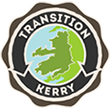
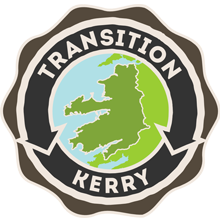
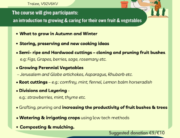

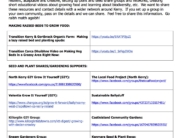
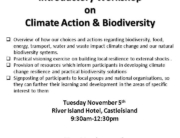
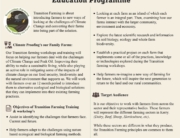
Leave A Comment